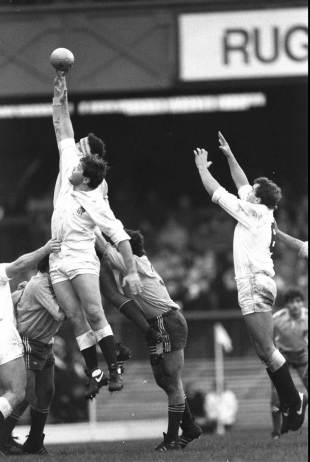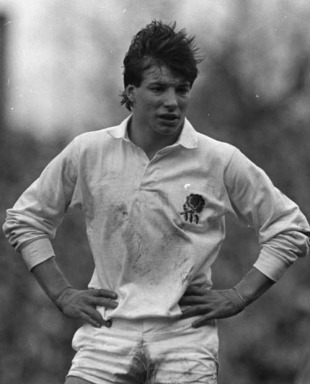|
England 22-15 Romania, Twickenham
The game that kickstarted an England revival
Richard Seeckts
January 5, 1985

Engalnd's John Orwin plucks the ball at the lineout against Romania
© Getty Images Enlarge
Twickenham was less than half full for the international baptism of Rob Andrew and Wade Dooley. Romania were at their best in the 1980s, a period in which they beat Wales and France twice each, and overcame Scotland's 1984 Grand Slam winners. Rugby in Romania, like other sports, was a propaganda tool for the communist regime under Nicolae Ceausescu, every success peddled as an endorsement of the government. The best players were given police or army employment, enabling them to train with the best coaches and facilities most of the time. Rugby participation in Romania peaked at 12,000 players and 110 clubs, numbers that can only be dreamed of now. England's fortunes, conversely, were at a particularly low ebb. Two wins from 12 matches in the previous two years reflected repeated shambolic showings on the field and what The Times described as "a selectorial pattern no more logical or consistent than that of a bingo caller." Astonishingly, England showed 11 changes from their previous match against Australia, only Nick Stringer and Rory Underwood surviving in the backs and Gary Pearce and Jon Hall up front. Hope was placed in six debutants, but they were not given much time to impress - none of the five who made their debuts against Australia made this XV. Leicester centre Paul Dodge returned to the side after a year out, becoming the fourth captain in 11 months after Peter Wheeler, John Scott and Nigel Melville. With no club league system in place, the Varsity match was as good a stage as any for England's selectors to cast their net. Cambridge had just recorded a fifth successive win for which fly-half Andrew, centre Kevin Simms and winger Simon Smith, an earlier blue, were rewarded with international selection. Dooley was plucked from rugby obscurity at lowly Preston Grasshoppers, where England coach Dick Greenwood was spending his rugby dotage. Richard Harding became England's fourth scrum-half in five games, John Orwin stepped in late for the injured Jim Syddall and David Cooke was called up when Gary Rees fell ill on the morning of the match. Cooke had played half an hour for Harlequins against the Army at the nearby Stoop when the call came. Little wonder, perhaps, that the match lacked polish. England's ambition extended no further than using Andrew's boot to accumulate points, while Romania, overwhelmed by their first visit to Twickenham, sought only to spoil England's possession and limit the damage. The first 43 seconds was the best period of the match. England ran the kick-off straight back at Romania, making 70 metres and forcing a lineout, from which Andrew dropped a goal. There was little to raise the pulse again until Smith, in the final minute, joined the elite band of players to score a try on debut.

The match signalled the start of Rob Andrew's international career
© Getty Images
Enlarge
The crowd grew restless, jeering when Stringer left the field, injured, in the first half and when the home side took pragmatic options. Those expecting festival rugby against weaker opponents were out of luck as Romania's hefty forwards and the reliable boot of Dumitru Alexandru, who kicked five penalties, kept them in touch throughout. Andrew had to kick for position until he was in range of the posts. An ugly win it was, but a win nonetheless. Harding's slow pass reduced Andrew's options so a back line offering plenty of pace was under-used. The pack held up well in the set pieces, Orwin and Dooley dominated the lineout and hooker Steve Brain said afterwards he had never felt more comfortable. But the limitations of "a team which hardly knew each other, thrown together like some Oxfam wardrobe" according to the Times, were plain for all to see. Andrew's cool-headed wisdom was the most encouraging aspect of the day. He ignored shouts to 'run it' and heckles of 'boring' to ensure a rare victory was secured. That he finished with a record 18 points on debut was incidental. 1985's Five Nations was hampered by postponements, but England stuck with the team that beat Romania, bar the injured Stringer, and started with a creditable 9-9 draw against France. Selectorially, England had turned a corner; consistent success on the field followed in years to come. Andrew (76 caps) and Dooley (57) became England's first choice in their positions for ten and eight years respectively, until each announced their retirement. Romanian rugby suffered with the deterioration of the country's political and economic situation after the revolution in 1989. Flanker and later captain, Florica Murariu, was shot dead at a roadblock on Christmas Day 1989, the most high profile of several rugby players to perish during the revolution. Romania have managed to play in every World Cup to date, but with little success. 
Romania's Dumitru Alexandru kicks for touch when playing against South West © Getty Images
Enlarge
© ESPN Sports Media Ltd
| |||||||||||||||
Live Sports
Communication error please reload the page.
-
Football
-
Cricket
-
Rugby
-
- Days
- Hrs
- Mins
- Secs
F1 - Abu Dhabi GP
Abu Dhabi Grand Prix December 11-131. Max Verstappen ()
2. Valtteri Bottas (Mercedes)
3. Lewis Hamilton (Mercedes)
4. Alexander Albon ()
5. Lando Norris ()
6. Carlos Sainz Jr ()
-
ESPNOtherLive >>
Golf - Houston Open
Snooker - China Open
Tennis - Miami Open

